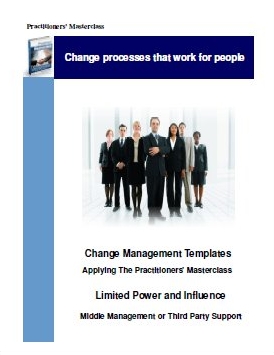 Templates Structure
Templates Structure
Each of the 4 “Power and Influence” change management templates follow this structure:
(1) Status
The high level key events in the early life cycle of the change initiative that are specific to the power and influence profile and organisational role.
(There are between 6 status points for the "Organisational Leaders" and "Middle Management" templates, and 3 status points for the "First Line Management and Supervisors", and "Non-Management Employees" templates.)
(2) Stalling Points
Factors that are usually ignored or unacknowledged, and that undermine and significantly increase the likelihood of failure at each status point
(3) Critical Action Point
The "one big thing" - a specific action or event that if instigated at this status point has major positive leverage on the change initiative
(4) Key Questions
Questions to be addressed by the critical actions point to reach the initial objective for this status point
(5) Initial Objective
The defined successful outcome of the critical action point at this status point
(6) What is most likely to go wrong
The attitudes and behaviours within yourself, your management peers and your organisation that will offer resistance and seek to undermine you at this status point
(7) Quick Metrics
Early informal feedback indicators